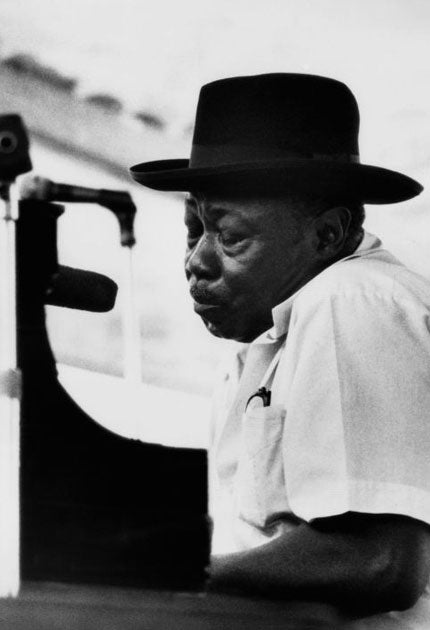Pinetop Perkins: Boogie-woogie and blues pianist who worked with Muddy Waters

A highly influential blues and boogie-woogie pianist, Pinetop Perkins spent over 10 years playing with the legendary Muddy Waters before going on to enjoy widespread acclaim as a solo act.
Joe Willie Perkins was born in Belzoni, a small town on the musically fertile Mississippi Delta, in 1913. He began his musical life playing the "diddly bow", a piece of wire stretched between two nails hammered into a wall, before taking up the guitar and becoming a popular fixture at house parties throughout the area.
In 1929, an acquaintance having given him the raw materials for a piano, he built one and learned to play it.He began to pattern his keyboard playing after that of Clarence "Pine Top" Smith whose "Pine Top's Boogie Woogie" (1928) had been instrumental in accelerating the burgeoning craze for boogie-woogie, and eventually adopted the sobriquet "Pinetop" in tribute to him.
By the early 1940s he was working as an itinerant bassist alongside the enigmatic guitarist Robert Nighthawk, accompanying him to Arkansas, where they performed on local radio. Soon Perkins (pictured right, AP) was poached by Sonny Boy Williamson II, the harmonica master whose work on the King Biscuit Time on KFFA, Helena, would help it to become the most influential blues shows in the South. Perkins stayed with Williamson for five years, losing his ability to play the guitar in the process when an angry chorus girl stabbed him in the left arm during an altercation.
By the decade's end he had again teamed up with Nighthawk, playing with him on the 1950 sessions forthe Chess brothers' Aristocrat label that resulted in the famous "Jackson Town Girl". He then headed toMemphis, recording, in the company of Earl Hooker, a pair of long-unissued sides for Sam Phillips' Sun label: "The Hucklebuck" and, for the first time, "Pine Top's Boogie Woogie" (both 1953). He spent the next decade working on and off with Hooker, a guitarist whose work would influence, among others, Jimi Hendrix.
In 1969 Perkins was invited to replace Muddy Waters' long-time pianist Otis Spann and his playing became an integral part of the Waters sound over the next decade, further enhancing his international profile. In 1980, however, he and several other members of the band, including Calvin "Fuzz" Jones and Willie "Big Eyes" Smith, split from their boss and formed an outfit named the Legendary Blues Band. Perkins stayed with them for a few years and appeared on their first two albums for Rounder Records, Life Of Ease (1981) and Red Hot 'n' Blue (1983).
He recorded throughout the 1990s, cutting a clutch of fine albums including Pinetop's Boogie Woogie (1992), Born In The Delta (1997), the Grammy-nominated Legends (1998), with Hubert Sumlin, Live At 85 (1999) and Back On Top (2000). In 2000 he received a prestigious National Heritage Fellowship from the National Endowment for the Arts, and in 2003 was inducted into the Blues Foundation's Hall of Fame.
Joe Willie Perkins, pianist: born Belzoni, Mississippi 7 July 1913; twice married; died Austin, Texas 21 March 2011.
Join our commenting forum
Join thought-provoking conversations, follow other Independent readers and see their replies
Comments